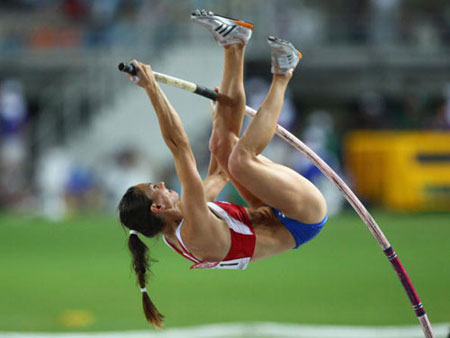
Story written by Eric
FAYETTEVILLE, Ark -- The University of Texas men's distance medley relay set a world record on Saturday at the 2008 Tyson Invitational held at the University of Arkansas, running 9.25,97 to easily qualify for next month's NCAA Indoor Championships.
The Longhorns' quartet of junior Kyle Miller (2.54,11), freshman Danzell Fortson (46,90), junior Jacob Hernandez (1.47) and senior Leo Manzano (3.57,96) also shattered the previous American record held by Stanford University and set a new stadium record in the process.
The Longhorn relay team's entry into the world record books was the fifth world mark set this indoor season in the past eight days with a little more than four weeks left before the season concludes with the IAAF World Indoor Championships and NCAA Championships.
Ethiopia's Kenenisa Bekele set a new indoor world record in the 2-mile in Birmingham on Saturday, with Russian Yelena Isinbayeva establishing a new world indoor standard later that afternoon at a meet in Donetsk, Ukraine (previous story).
Manzano, who won the mile championship (3.59,21, the third-fastest time in UT school history) at the New Balance Invitational last week and met the NCAA automatic standard, remained calm during the latter part of the event, and focussed on making up for their previous medley relay run last week.
"I heard the fans and my teammates shouting times and saying I was on pace for a world record," Manzano stated following his race.
"I just told myself to run hard and fast, and don’t worry about that. I just needed to stay calm and finish the race for my teammates. Once I crossed the line and saw the time, I knew we had the mark."
Miller has a 3.44,54 best for 1.500m, and opened his weekend pursuit with a personal best 4.00,50 in the Olympic Development mile on Friday night, finishing second to teammate Jake Morse by 0,09 seconds.
Fortson, a true freshman, was a two-time Texas UIL 400-meter champion (Class 4A in 2006, Class 5A in 2007) at Keller Central High School, and boasts a 46,70 400m life-time best.
Hernandez, a two-time All-American, has a 1.47,96 outdoor best at 800m, and had equalled the UT indoor record with a 1.49,25 set last week at the New Balance Invitational, warmed up for the distance medley by winning the Men's Olympic Development 800m on Friday in a lifetime best -- and UT record -- of 1.47,89.
Manzano, the two-time NCAA 1.500m champion (2005, 2006) and seven-time Big 12 champion, holds lifetime bests of 1.49,26/3.58,78 indoors, and a 3.35,29 best over 1.500m outdoors.
The University of Michigan, comprised of a team of Nate Brannen (2.54,5), DarNell Talbert (47,4), Andrew Ellerton (1.48,4) and Nick Willis (3.57,5) held the previous world, NCAA and Randal Tyson Track Center records of 9.27,77 set on 2004-March-12.
The relay team also bettered by 2,86 seconds the previous American record of 9.28,83 set by Stanford University on 2000-March-10. The Cardinal featured a team of Gabe Jennings (2.52,1), Evan Kelty (48,3), Michael Stember (1.48,4) and Jonathon Riley (4.00,0).
Jennings and Stember would go on to make the 2000 U.S. Olympic team in the 1.500m.
Texas also bettered the previous school record of 9:31.27 set on 2007-March-2 at the Wilson Invitational (Notre Dame Last Chance Meet). Hernandez and Manzano ran the final two legs of the previous school best last year, splitting 1.47 and 3.57, respectively.
Texas finished eighth (9.41,81) in the 2007 NCAA Indoor Championships in Fayetteville, a race won by Stanford in a world-leading 9.33,64. Manzano anchored that race in 4.04,73.
Stanford may prove to be a great contender this year as well, despite Texas' record-shattering time, with Garret Heath running a 3.58,71 mile -- the third-fastest indoors in Stanford history, in finishing second at the Husky Classic.
Arkansas, which holds the collegiate outdoor Distance Medley record (9.20,10) set at the 1989 Penn Relays, was considered one of the favourites on Saturday, but appeared to have simply gone 'through the motions,' according to their long-time coach, John McDonnell (story).
Men Distance Medley
================================================================
School Finals
================================================================
1 Texas 9:25.97
2 LSU 9:35.31
3 Arkansas 9:39.63
4 Oklahoma 9:45.64
5 Oktebehha TC 9:47.29
6 Texas Tech 9:50.32
7 Georgia 9:52.73
8 Michigan 9:56.11
9 Harding 10:00.99
10 Rend Lake CC 10:04.36
11 Butler CC 10:07.29
12 Clemson 10:11.18
13 Western State 10:12.12
==================================================================
Event 42 Men 800 Meter Run Olympic Dev
Randal Tyson: 1:45.33 3/10/2001 Patrick Nduwimana, Arizona
NCAA Auto: A 1:48.20
NCAA Prov: P 1:50.50
Name Year School Finals
Section 1
1 Jacob Hernandez Texas 1.47,89A
2 Andrew Heaney Unattached 1.48,04A
3 Tim Harris Miami 1.48,59P
4 Prince Mumba Unattached 1.49,24P
5 Mark Miller Penn State 1.49,43P
6 Reuben Twiluke LSU 1.50,46P
7 Tevan Everett Texas 1.50,58
8 Cory Primm UCLA 1.50,92
9 James Gilreath Baylor 1.53,46
=================================================================
Event 44 Men 1 Mile Run Olympic Dev
Randal Tyson: 3:49.89 2/11/2005 Bernard Lagat, Nike
NCAA Auto: A 3:59.50
NCAA Prov: P 4:04.00
Name Year School Finals
Finals
1 Jake Morse Texas 4.00,41P
2 Kyle Miller Texas 4.00,50P
3 Micky Cobrin Arkansas 4.00,87P
4 Shadrack Songok TAMU - Corpu 4.01,03P
5 Scott Overall Unattached 4.01,18P
6 Kyle King Unattached 4.02,79P
7 Matt Lincoln Unattached 4.03,60P
8 Laef Barnes UCLA 4.05,43
9 John Martinez NC State 4.12,66
10 Samuel Borchers Penn State 4.13,98
11 Michael Chinchar Arkansas 4.20,51
==================================================================





